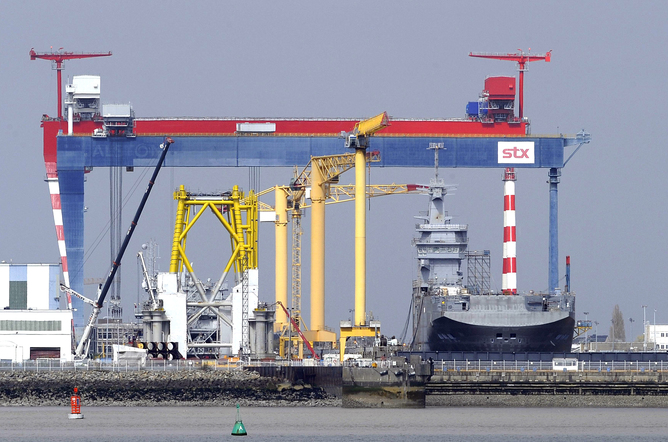Who wants to buy a couple of warships from France to stop Russia getting them?
- Written by Simon J Smith Research Associate, Department of Politics, Languages & International Studies at University of Bath

When it comes to politics, there is a generally held belief that when it is working, it is boring. Europe’s foreign policy politics routinely breaks this axiom because while it can rarely said to be working, it is always fairly predictable. The recent failure of Europe to act robustly and collectively towards Russian aggression is a case in point.
As Julian Lindley-French has recently written:
indeed, too many EU member-states no longer have a foreign policy at all (Britain most particularly). What is left is a kind of transactional politics in which “foreign policy” is directly linked to perceived economic cost.
Unfortunately, the tragedy of 298 souls lost on Malaysia Airlines flight MH17 as a result of Russia’s continued destabilising tactics in the Ukraine has done little to change this.
In a matter of days after this senseless tragedy, European leaders had already turned on each other. France and the UK have been the most obvious culprits. Some in France have labelled the UK government as “hypocrites” owing to the large benefit the City receives from Russian capital. Cameron, in turn, has referred to the sale of two French Mistral war ships to Russia as “unthinkable” in the UK. Meanwhile, Britain continues to sell arms to Russia.
Yet the fate of the French warships could be a way of not only providing a financial and political exit strategy for Paris but they could also give Europe, most notably NATO Europe, a tremendous boost in solidarity.
Two birds with one stone
I have recently put forward the argument that “underpinning diplomacy through reinforced conventional deterrence is NATO’s core raison d'être. The problem is in the sharing of the burden across the alliance”. A recent proposal for NATO to buy the Mistral-class warships and operate them as a collective asset provides one opportunity for NATO in Europe to do exactly that, while at the same time showing collective strength towards Russia. In other words, it could kill two birds with one stone.
Apart from the message it sends to the European public (especially in the wake of recent events), selling an expansionist Russia two highly-capable amphibious assault ships also makes little strategic sense for France and her allies. Not only would Russia be handed two force-multiplying capabilities that could be used should they continue to meddle in their so-called “near-abroad”, but it cannot be ruled out that one or both of these ships would eventually be deployed to Russia’s Black Sea fleet. This would provide Russia with a potentially much fiercer presence in the Mediterranean and cause NATO an additional thorn in its side.
Other options
The idea that NATO buy the ships and use them as collective assets is not the only strategy available. Apart from France just moving ahead with the sale to Russia or the unlikely decision of France to just take the loss, there are two further options. One is for the EU to collectively buy the ships and bolster its much-deflated Common Security and Defence Policy. The second, the US could buy them alone. Let us look at both options in-turn before outlining why the NATO option is, although still unlikely, the superior approach.
The various obstacles to a robust CSDP are manifold – lack of collective will principal among them. Although there is no reason, in principle, for the EU not to acquire these ships and give its existing battlegroup concept a much-needed boost, the chances of this happening in an EU context is about as likely as a nascent Swiss navy purchasing them. This alone makes the proposal a non-starter.
The option for the US to relieve the economic burden on France by purchasing the warships for the US Navy is much more likely (than the EU option), given both its massive defence budget and the space it has for the two ships in its so-called “gator navy” of amphibious craft. The increased US frustration with the French propensity to go ahead with the sale, as recently summed up by former US Defence Secretary Robert Gates as “outrageous”, could ultimately lead to such a compromise.
Showing solidarity in Europe
However, this option still leaves out the value of showing European solidarity. There is little doubt that if NATO were to buy the ships, the US would probably have to cough up the lion’s share of the cost. Yet, if the rest of the NATO allies could collectively pay the remainder of the bill, it would give the alliance a much-needed scheme to offset its declining defence budgets and to bolster its collective defence capabilities.
More importantly, it would give NATO’s Eastern Allies a sense of reassurance that recently they have been lacking. It would also give NATO, as a whole, two fewer highly-capable Russian assets to worry about strategically.
The odds of NATO collectively buying the French ships are still low. This is due to both the over-riding economic concerns among European nations domestically and the timidity of many European allies to give Putin the impression that they are taking a bellicose response to Russian expansionism. But if the downing of flight MH17 truly is a game-changer, then this collective response by NATO is not a bad way to start changing the game.

